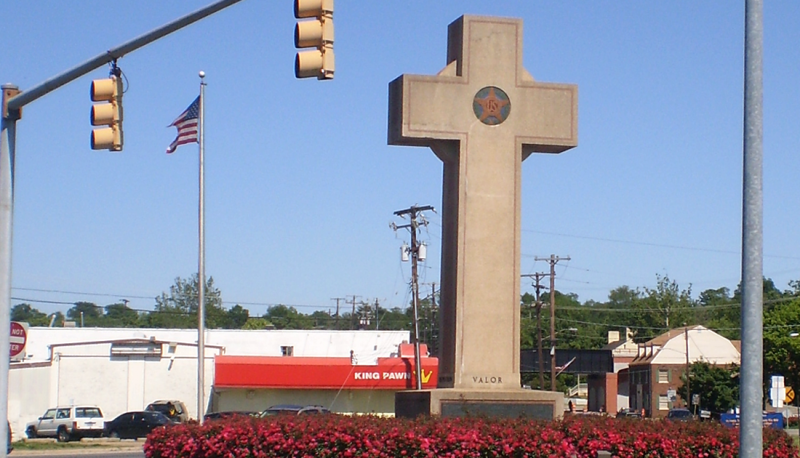On February 27, the Supreme Court held oral arguments in a case that puts the First Amendment’s Establishment Clause at substantial risk. With an ultra-conservative majority made possible only through Donald Trump as enabled by Mitch McConnell’s unprecedented anti-democratic machinations, the Court may severely weaken the wall of separation between church and state.
Generally, the Establishment Clause prohibits government actions and displays that have the primary effect of endorsing religion. As history has shown across the world innumerable times, and as the drafters of the Constitution knew well, such mixture of faith and government is a recipe for harmful and otherwise avoidable conflict.
Eroding the wall of separation has been a long-term priority of the Religious Right. A key reason the modern conservative movement has for so long focused on capturing the federal judiciary is that much of their agenda—imposing their religious beliefs about abortion and LGBTQ people on others through the force of law, taxpayer financing of religion, using government facilities and events for prayer and proselytizing—violates the Constitution. Since the movement’s earliest days, our nation’s federal courts have stood as a bulwark against the far right’s overreach. As a result, they have sought to place ideological allies on the bench. It is why they worked so hard to keep the indisputably qualified Merrick Garland off the Supreme Court, so a Republican president could elevate ultra-conservatives like Neil Gorsuch and Brett Kavanaugh to the nation’s highest court.
Now, the conservative movement sees a golden opportunity to change the Establishment Clause and allow government endorsement not only of religion in general, but of particular faiths.
The parties are litigating over an enormous state-owned cross used as a memorial to local men killed in World War One. Built in the 1920s by the American Legion, it was acquired several decades ago by Maryland, which pays for its upkeep, repair, and renovations. It towers 40 feet high above the surrounding area, situated on a traffic island in a busy traffic intersection. A panel of the Fourth Circuit applied clear Supreme Court precedent and held it unconstitutional because it “has the primary effect of endorsing religion.”
The state defends the monument’s constitutionality as consistent with that precedent, arguing that it is a secular monument that simply “bears the shape of a cross.” Maryland claims that when the monument was built, the Latin cross was regarded as a “universal symbol” of the sacrifices of those who died in the war and is recognized by the public as a non-religious, commemorative honor for the dead.
That would likely surprise non-Christians, many of whom would recoil at the idea of using the central symbol of Christianity for their own graves or monuments. As an amicus brief filed by a number of religious and civil rights organizations (including our affiliate PFAW Foundation) pointed out:
For members of minority faiths, the towering Latin cross here conveys a strong message of exclusion and secondary status, whatever the counties’ intent. It announces that Bladensburg [Maryland] is a Christian polity, where Christians “are insiders, favored members of the political community,” and all others “are outsiders.” [quoting previous Supreme Court cases]
While Maryland seeks to water down the “endorsement” test with a war-memorial exception, the far Right wants to destroy precedent altogether. The American Legion urges the Court to overturn precedent and rule that government endorsement of religion is actually constitutional, as long as it does not coerce others into agreeing (with coercion conveniently defined ambiguously but narrowly). This would please the far Right immensely, since it would allow substantial denominational favoritism and government support for Christianity. Yet, as the amicus brief states:
[We] do not believe that anyone seriously supposes the First Amendment to allow a country full of towns erecting monuments to their preferred faiths and denominations—and town halls consumed by heated debates over which to favor.
As even the ultra-conservative majority recognized in upholding Trump’s Muslim ban, “the clearest command of the Establishment Clause is that one religious denomination cannot be officially preferred over another.”
Of course, this is the same five-justice majority that just weeks ago let Alabama deny a death row inmate’s request for an imam to be present at his execution, even though it provides a Christian chaplain to those requesting one.
After oral arguments, press reports suggested that the Court appeared likely to uphold the cross. Such a result, and the damage it would do to the First Amendment, would be a prime example of the impact that Donald Trump’s judicial appointments are having on our rights.
The consolidated case are American Legion v. American Humanist Association and Maryland-National Capital Park and Planning Commission v. American Humanist Association.

